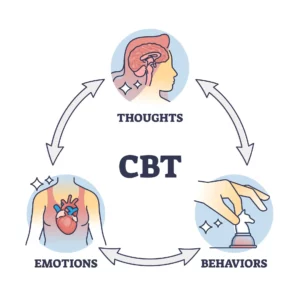From team meetings at work to casual gatherings with friends, social interactions are a fundamental part of our daily lives. However, for many individuals, these situations can trigger overwhelming anxiety, fear, and self-doubt. Social anxiety is not just mere shyness; it’s a profound fear of being judged, negatively evaluated, or rejected in a social or performance setting. Thankfully, there is a proven method to combat this daunting challenge: Cognitive Behavioral Therapy (CBT). In this blog post, we will delve deep into the nuances of social anxiety and explore how CBT for social anxiety provides a structured, practical framework.
Contents
Understanding Social Anxiety
 Social anxiety, often termed social anxiety disorder (SAD), is characterized by an intense fear of being judged, negatively evaluated, or rejected in social or performance situations. Individuals with social anxiety often avoid everyday interactions or endure them with significant distress, fearing they’ll act in ways that will be embarrassing or humiliating. The anxiety can manifest physically through symptoms like trembling, sweating, rapid heartbeat, and nausea.
Social anxiety, often termed social anxiety disorder (SAD), is characterized by an intense fear of being judged, negatively evaluated, or rejected in social or performance situations. Individuals with social anxiety often avoid everyday interactions or endure them with significant distress, fearing they’ll act in ways that will be embarrassing or humiliating. The anxiety can manifest physically through symptoms like trembling, sweating, rapid heartbeat, and nausea.
The roots of social anxiety can vary, often stemming from a mix of environmental factors and genetics. Past negative social experiences, like bullying or public embarrassment, might contribute to the development of this disorder. Moreover, a heightened sensitivity to facial expressions, an overactive amygdala (responsible for fear responses), or a tendency towards self-evaluation and criticism can make an individual more susceptible to social anxiety.
Whatever the cause, understanding and addressing this disorder is crucial, as it can significantly impact an individual’s overall quality of life.
Is CBT Good For Social Anxiety?
Cognitive Behavioral Therapy (CBT) is a widely recognized and empirically supported treatment for social anxiety disorder. Rooted in the principle that thoughts, feelings, and behaviors are interconnected, CBT specifically targets maladaptive thought patterns that perpetuate anxiety. Numerous clinical studies have shown that CBT can lead to significant reductions in the symptoms of social anxiety. Along with many individuals experiencing sustained relief after completing therapy.
Moreover, CBT for social anxiety often includes exposure techniques, where individuals are gradually and systematically introduced to feared social situations in a controlled manner. This helps desensitize them to the triggers of their anxiety and build their confidence in social contexts. Over time, with practice and guidance, many individuals find that they not only manage their social anxiety better but also enjoy improved overall well-being.
What Is The CBT Model For Social Anxiety?
 The Cognitive Behavioral Therapy (CBT) model for social anxiety is founded on the interaction between thoughts, behaviors, and feelings. Below is a more detailed exploration of the CBT model applied to social anxiety:
The Cognitive Behavioral Therapy (CBT) model for social anxiety is founded on the interaction between thoughts, behaviors, and feelings. Below is a more detailed exploration of the CBT model applied to social anxiety:
Cognitive Component
- Identifying Negative Thoughts: Individuals are taught to recognize their automatic negative thoughts that arise in social situations, such as fearing negative evaluation or believing they will embarrass themselves.
- Cognitive Restructuring: Once the negative thoughts are identified, individuals learn to challenge and modify them, replacing them with more balanced and rational thoughts.
Behavioral Component
- Behavioral Experiments: Individuals are encouraged to test out their new balanced thoughts in social situations and observe the outcomes. And, helping to recalibrate their beliefs and expectations.
- Exposure Techniques: Gradual and systematic exposure to feared social situations enables individuals to face and overcome their anxiety progressively.
Emotional Component
- Emotional Regulation: Individuals are trained in techniques to manage their emotional responses to social situations, such as deep breathing and progressive muscle relaxation.
Maintenance and Relapse Prevention
- Developing Coping Strategies: Learning and practicing coping strategies help in dealing with social anxiety triggers effectively.
- Building Resilience: Regularly reviewing progress and setting new goals help in building resilience and preventing the recurrence of overwhelming social anxiety.
Example:
An individual with social anxiety might avoid public speaking due to the fear of embarrassment. In CBT, this person would identify and challenge these fears (the cognitive component), and gradually expose themselves to public speaking situations (the behavioral component). And learn to manage the associated anxiety (emotional component), eventually building resilience and coping mechanisms for future situations.
Through this model, individuals suffering from social anxiety can develop healthier thinking patterns, confront their fears, manage their emotions, and prevent relapse. Eventually, this leads to an improved quality of life.
CBT Techniques For Overcoming Social Anxiety
Here are some CBT techniques specifically designed to address social anxiety:
1. Self-Monitoring
Individuals track their anxious thoughts, feelings, and behaviors in specific social situations to gain insight into patterns and triggers.
2. Video Feedback
Recording and then reviewing one’s performance in social situations to confront and correct distorted self-perceptions and recognize positive behaviors.
3. Role-Playing
Practicing challenging social scenarios in a controlled environment to develop new skills and reduce anticipatory anxiety.
4. Situational Attentional Refocusing
Learning to shift attention outward, away from oneself, during anxiety-provoking situations, reducing self-focused rumination and increasing engagement.
5. Interoceptive Exposure
Deliberately inducing physical sensations associated with anxiety (like rapid heartbeat) in a controlled setting, helping the person become less fearful of these sensations in real-life situations.
6. Safety Behavior Reduction
Identifying and gradually reducing behaviors that individuals use to feel “safe” but that maintain or exacerbate anxiety, such as avoiding eye contact or rehearsing sentences before speaking.
7. Assertiveness Training
Helping individuals communicate their needs and rights more effectively, leads to increased self-confidence in social situations.
8. Mindfulness and Acceptance Strategies
Practicing present-focused attention and non-judgmental awareness of thoughts, feelings, and sensations. This can help decrease rumination and increase tolerance of uncomfortable feelings.
9. Rational Emotive Behavior Therapy (REBT)
A subset of CBT that focuses on identifying and disputing irrational beliefs. For social anxiety, this might involve challenging beliefs like “I must always be liked by everyone.”
10. Homework Assignments
Practicing techniques and confronting social anxiety triggers outside of therapy sessions to reinforce learning and progress.
Each of these techniques aims to provide individuals with tangible tools to confront and manage their social anxiety. As with any therapeutic technique, their effectiveness can vary from person to person.
How Effective Is CBT For Social Anxiety?
 CBT for social anxiety is considered one of the most effective treatments. Numerous research studies and clinical trials have consistently demonstrated its efficacy. Here’s a breakdown of its effectiveness:
CBT for social anxiety is considered one of the most effective treatments. Numerous research studies and clinical trials have consistently demonstrated its efficacy. Here’s a breakdown of its effectiveness:
- Evidence-Based
CBT is an evidence-based treatment, meaning its effectiveness is supported by a significant body of research. Numerous studies comparing CBT to other treatments (or no treatment) have found it to be superior in reducing symptoms of social anxiety.
- Targeted Intervention
CBT specifically targets the maladaptive thought patterns and behaviors associated with social anxiety. By directly addressing these core issues, it provides individuals with practical skills to manage and reduce their anxiety.
- Long-Term Benefits
The effects of CBT tend to be lasting. Studies have shown that the gains made during CBT treatment for social anxiety are maintained over the long term, even after therapy has ended. This is because CBT equips individuals with the skills to manage their anxiety and handle future challenges independently.
- Positive Response Rates
While individual response rates can vary, a substantial proportion of individuals with SAD experience significant symptom reduction or remission after undergoing CBT. Some studies suggest response rates of over 50%, with many of those individuals maintaining these improvements over time.
- Adaptable and Versatile
CBT can be delivered in various formats, including individual therapy, group therapy, online platforms, and self-help books. Therefore, this versatility allows individuals to find a format that best suits their needs and comfort levels.
Thus, it’s essential to note, however, that while CBT is effective for many individuals with social anxiety, it may not work for everyone. The therapeutic alliance, individual commitment to the process, and the severity of the disorder can all influence outcomes.
How To Find The Right CBT Therapist Near Me?
 Finding the right Cognitive Behavioral Therapy (CBT) therapist near you is a crucial step in effectively addressing issues like anxiety, depression, or other mental health concerns. Here’s a step-by-step guide to help you find the right CBT therapist:
Finding the right Cognitive Behavioral Therapy (CBT) therapist near you is a crucial step in effectively addressing issues like anxiety, depression, or other mental health concerns. Here’s a step-by-step guide to help you find the right CBT therapist:
- Determine Your Goals: Start by clarifying what you want to achieve with therapy. Are you seeking help for social anxiety, depression, or another specific issue? Knowing your goals will help you find a therapist with the right expertise.
- Ask for Recommendations: Seek recommendations from trusted sources, such as your primary care physician, friends, family, or other healthcare providers. They may know of reputable CBT therapists in your area.
- Online Directories: Use online therapist directories and databases. Websites like MantraCare, TherapyMantra, and TherapyDen allow you to search for therapists by location, specialties, and insurance acceptance. Read therapists’ profiles to learn more about their approach and experience.
- Research Credentials: Ensure that the therapist you choose is licensed and has appropriate credentials. In the United States, for example, look for professionals who are licensed by state boards.
- Consider Specializations: Look for therapists who specialize in the specific issue you’re dealing with, whether it’s social anxiety, OCD, or another concern. Specialized training and experience can be beneficial.
- Ask About CBT Expertise: During consultations, inquire about the therapist’s experience with CBT. Ask how they incorporate CBT techniques into their practice and if they have successfully treated clients with similar issues.
- Consider Fit: Trust your instincts about whether you feel a connection and sense of trust with the therapist. A strong therapeutic alliance is crucial for successful therapy.
- Accessibility and Convenience: Consider the location, office hours, and whether the therapist offers teletherapy if that’s important for your schedule or comfort.
- Cost and Payment Options: Discuss fees, payment methods, and whether the therapist offers a sliding scale or other payment options if cost is a concern.
Finding the right CBT therapist is a personal process, and it may take some time to find the perfect fit. Don’t be discouraged if you need to meet with a few therapists before making a decision.
Conclusion
In the journey to overcome social anxiety, Cognitive Behavioral Therapy (CBT) emerges as a guiding light, offering individuals a structured path toward liberation. Through a multifaceted approach that challenges negative thought patterns, employs exposure techniques, and equips individuals with practical tools, CBT empowers them to regain control of their lives. Remember that seeking the right CBT therapist and committing to the process can be transformative.
Hence, it opens doors to a world where social interactions are no longer sources of dread but opportunities for growth, connection, and fulfillment. If you are experiencing anxiety-related issues, Online Anxiety Counseling at TherapyMantra can help: Book a trial Online therapy session


